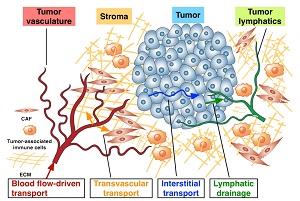 |
| A depiction of the tumor microenvironment, which often impedes drug delivery--Courtesy of Purdue University |
Biotech startups often tout promising animal studies, but beware, at least when it comes to cancer drug delivery, success in mice rarely translates to success in humans, Purdue University researchers say. New in vitro tests that emulate the tumor micro-environment are needed.
They point out that targeting a tumor's stromal cells, located in its extracellular matrix, increased survival in a genetically engineered mouse model of pancreatic ductal adenocarcinoma, but did not prove effective in human clinical trials.
Differences between the tumor micro-environment in mice and humans may account for the varying results, and the quantity of drug needed to be delivered to the tumor to achieve a clinical outcome is often vastly higher in humans than in rodents.
In an article in the National Institutes of Health's cancer nanotechnology roadmap, the researchers maintain that focusing on the stroma is a promising approach delivering a drug near the tumor is often insufficient because their microenvironment can inhibit uptake into the cancerous mass. They say a more human-centric research approach is needed to deploy the strategy.
To that end, the Purdue researchers are developing a tumor-microenvironment-on-a-chip device, in hopes of testing drug delivery approaches in contexts that are similar to the human body.
"Recent advances in tissue engineering and microfluidic technologies present an opportunity to realize in-vitro platforms as alternatives to animal testing," Purdue University biomedical engineering professor Kinam Park said." Tumor cells can be grown in 3D matrices with other relevant stromal cells to more closely mirror the complexity of solid tumors in patients. The current ability of forming 3D-perfused tumor tissue needs to be advanced further to create an accurate tumor microenvironment."
The lab-on-a-chip concept seems to be gaining traction as a means of helping drugmakers overcome R&D challenges, including drug delivery. Molecular diagnostics firm Biological Dynamics of San Diego last year roped in $26.8 million in a Series C round to support development of its lab-on-a-chip testing device for cancer.
And in December, Merck ($MRK) said it was expanding its collaboration with Cambridge, MA's Emulate focused on predictive modeling of inflammatory processes in the human lung and the gastrointestinal system using the Small Airway Lung-Chip and Intestine-Chip.
- read the university news release
- here's more in NIH's cancer nanotechnology roadmap (PDF)